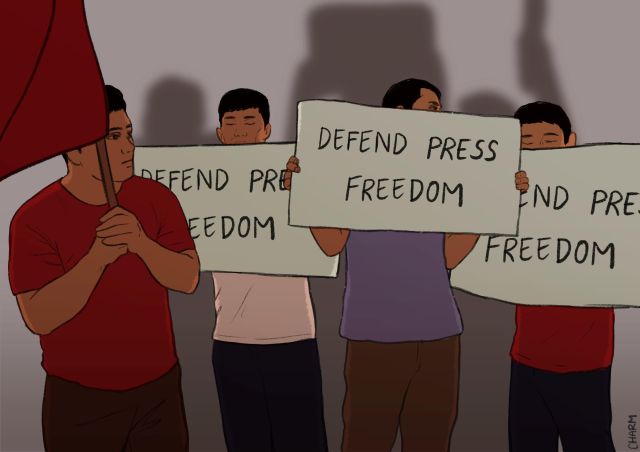
Maria Ressa was arrested on February 13 over a string of alleged “cyber libel” and tax evasion cases. As head of the news website Rappler.com, her prosecution is a further step in undermining press freedom in the country.
According to Rappler, the Philippines ranks the fifth worst country in unsolved media killings. While Duterte has created a taskforce, it has so far failed to hold anyone accountable for violence against journalists.
Ressa was named a Time Magazine “Person of the Year” in 2018, along with murdered Saudi journalist Jamal Khashoggi and others, for their job of “taking great risks in pursuit of greater truths”.
Rappler has been documenting Duterte’s drug war and extrajudicial killings, in which some 12,000 people have died according to Human Rights Watch.
Historically, when journalists are threatened by the state, they can rely on working-class organisations to come to their defence.
When Ferdinand Marcos’ martial law regime systematically shut down the press in the 1970s by limiting the flow of news and information to government propaganda or underground exposés by the “Mosquito Press”; workers organised nationwide strikes to demand labour rights as well as the restoration of democratic rights, including press freedoms.
Unions and mass organisations became the media, risking death to circulate statements advocating democracy.
When the Manila Times newspaper was forced to close down (and eventually sell out to a government crony) in July 1999, due to a ₱100 million libel case against it by then-President Joseph Estrada over an article exposing an anomalous power contract with an Argentinian corporation worth 17 billion, it sparked two years of protests by working-class groups that culminated in Estrada’s ouster by the popular movement.
When the patriarchs of the Ampatuan warlord family masterminded the mass killing of 58 people, including 32 journalists, in an election-related incident on November 23, 2009, the late labour leader Romy Castillo of Solidarity of Filipino Workers (BMP) invited me to join him and fellow worker activists in a night-long action across Quezon City.
We spray-painted our condemnation on walls throughout the city a few hours after the news broke, and organised a lightning rally in front of news network GMA-7 where Romy and other activists expressed their support for the protection of all media workers. Several mass actions by other working class organisations followed.
When Ressa was arrested, working class organisations were among the first to issue support statements. Some activists went to the National Bureau of Investigation headquarters where she was detained, to show solidarity.
We must not forget that at the height of the Spanish and American colonial oppression, printing press unionists and labour leaders including Isabelodelos Reyes and Hermenegildo Cruz were among the finest journalists and truth-tellers.
In this dark time, it is imperative for Filipino journalists to take a clear stand and link up with progressive labour organisations that have consistently stood up for democracy and human rights, and for linking arms with the urban and rural poor, women, youth and, during media repression, journalists.
Most of all, progressive labour has always been an enduring, leading force for democracy.
While it saddens labour activists that the media hardly covers our strikes and struggles, progressive workers will continue to stand for media freedom and democracy.
Even Ressa, a media freedom campaigner and Pacific Plaza Towers homeowner, remained silent in the recent labour dispute in the upscale Manila condominium rather than come out and convince her fellow homeowners to push management to reinstate and renew the contracts of their striking workers.
Yet, in spite of their wariness, the Pacific Plaza rank-and-file union Punyal want the trumped up charges against Ressa to be dropped. In fact, as part of the BMP the unionists are still active and are committed to the broader movement for democratic rights.
At the launch of the Labor Win senatorial slate on February 14, five senatorial candidates from the working class and their party-lists, such as the socialist Party of the Laboring Masses and Bayan Muna, committed to defend freedom of the press and specifically to campaign for charges against Ressa to be dropped. They also want the repeal of libel laws.
To all co-workers in the media, let us not allow another news outfit closure, another media killing, or another arbitrary media arrest to happen. This is not the time to sit on the fence and go on gently with our trade. Now is the time to stand together with the workers and the progressive mass movements.
[Merck Maguddayao is a labour organiser and journalist. He is the general secretary of the Solidarity of Unions in the Philippines for Empowerment and Reforms (SUPER).]